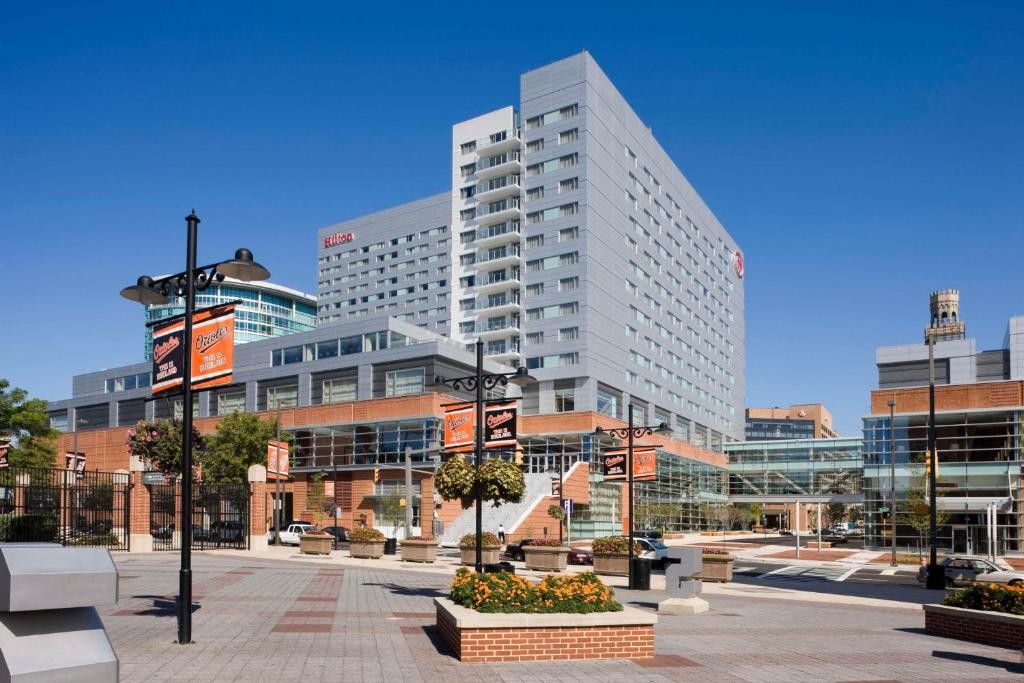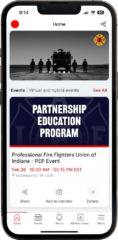
4th District Conference
This district conference will bring in IAFF leadership from Delaware, the District of Columbia, Maryland, Pennsylvania, Virginia, and West Virginia. Don’t miss the opportunity to network with a diverse group of affiliates and learn new skills and resources for facing your Local’s unique challenges

Stay updated on event information with the IAFF mobile app.
Registration
Registration is open to all leaders of the 4th District. Early registration is strongly encouraged.
Registration fee: $295
For more information, contact [email protected].
Agenda
SUNDAY Nov. 9
- 4-9 p.m.
-
Welcome Reception | (Offsite) Baltimore 734 Union Hall
Monday, Nov. 10
- 8-10 a.m.
-
Registration
- 9:30 a.m.-12 p.m.
-
General Session
Presentation of Colors
Local 734 President Remarks
Local 964 President Remarks
Governor Wes Moore Remarks
Andrew Pantelis, 4th District Vice President, International Association of Fire Fighters
Edward A. Kelly, General President, International Association of Fire Fighters
Frank V. Líma, General Secretary-Treasurer, International Association of Fire Fighters
Wayne Murphy, Chief of Staff, International Association of Fire Fighters
Sean DeCrane, Assistant to the General President, Health & Safety
Dr. Dan Whu, Chief Medical Officer
Peter Leff, IAFF Legal Counsel
- 12-1:30 p.m.
-
Lunch
- 1:30-3:30 p.m.
-
General Session
Ryan Heffernan, Assistant to the General President, Communications
Kevin O’Connor, Assistant to the General President, Government Affairs & Political Action
Tim Dupin, Director, Political Action
Maureen Green, Assistant to the General Secretary-Treasurer, Membership
Doug Stern, Director of Operations
Joshua Smith, Assistant to the General President, Training, Education, & Grants Administration
Robert McClintock, Assistant to the General President, TAIR
Allan Westcott, Chief Operating Officer, IAFF Financial Corporation
- 3:30-5 p.m.
-
District Caucus
Tuesday, Nov. 11
- 7-8 a.m.
-
Breakfast
- 7-8:30 a.m.
-
Registration
- 8-10 a.m.
-
Workshop Breakouts
- 10-10:15 a.m.
-
Break
- 10:15 a.m.-12:15 p.m.
-
Workshop Breakouts
- 12:15-1:15 p.m.
-
Lunch
- 1:15-3:15 p.m.
-
Workshop Breakouts
- 3:15-3:30 p.m.
-
Break
- 3:30-5:30 p.m.
-
Workshop Breakouts
Workshops
Grievances and Arbitration Track
Introduction to Grievances
The manner in which you process grievances will determine how quickly they are resolved and how your members will perceive you. A good understanding of the grievance process will better enable you to enforce the collective bargaining agreement and avoid costly arbitration hearings. In this workshop, you will learn how to evaluate and file a grievance, reduce your chances of receiving a DFR claim, and develop effective grievance strategies. This workshop is ideal for local union officers and grievance committee members who have limited experience with grievances.
Preparing for Grievance Arbitration: Choosing an Arbitrator
Despite your best efforts to resolve all disputes internally, some grievances cannot be settled at the local level and must be heard by a neutral arbitrator. To win at arbitration, a union leader must be well prepared and have a good understanding of the arbitration process. This workshop will give you an overview of arbitration procedures and protocol, methods for selecting an arbitrator and strategies for cutting costs. This workshop is ideal for local union officers and grievance committee members who work in collective bargaining environments and have limited experience with grievances.
Preparing for Grievance Arbitration: Contract Language
The collective bargaining agreement is a contract between union and management that outlines the wages, benefits, and working conditions for fire fighters. To maintain flexibility in the workplace, negotiators sometimes include language in the agreement that is ambiguous or general in nature. Occasionally, this ambiguity leads to disputes between the two parties over the meaning of the contract. When these disputes are brought to arbitration, the arbitrator must determine which interpretation is the most reasonable and best reflects the mutual intent of the parties. This workshop will teach you how arbitrators consider contract language, past practice, and other contributing factors in order to reach a decision.
Preparing for Grievance Arbitration: Evaluating Evidence
To win your case in grievance arbitration, it is crucial to have evidence to back up your arguments and assertions. Without sufficient evidence, it is difficult to convince an arbitrator to rule in your favor. This workshop will teach you how to gather evidence, identify the types of evidence admissible in arbitration, and determine which types carry the most weight with arbitrators. This workshop is ideal for local union officers and grievance committee members who have limited experience with grievances.
Politics and Public Relations Track
Building Coalitions
A coalition is a group of individuals or organizations that work together to achieve common goals and solve problems. A coalition can be formal or informal in structure depending on its purpose. Due to its size and scope, a coalition can accomplish significantly more than an individual organization. This workshop will teach you how to build coalitions and use them to achieve your goals.
Establishing and Maintaining a Political Action Committee
State and local officials — and state and local laws — affect your wages, benefits, labor laws and working environment. With a state and/or local political action committee (PAC), fire fighters can help support the campaigns of officials, candidates and ballot issues that represent their communities’ best interests. This workshop addresses not just the laws and regulations affecting state and local PACs, but also how to promote a PAC, raise funds and plan contributions.
Introduction to Public Relations
A strategic public relations program will enable your local to use public support to achieve its goals and handle an unforeseen crisis. By communicating effectively with the public and local officials, a union is more likely to secure better wages for its members, improve staffing and avoid budget cuts. This workshop is designed to give you the tools and tactics you need to set up a successful public relations program for your local.
Recruiting and Endorsing Candidates
For political candidates, the endorsement of fire fighters is the most coveted endorsement in campaigns today. The political action of an affiliate is what it takes to move fire service issues forward. In this workshop, you will learn how to select a candidate and campaign for political action, understand the endorsement process and create a local endorsement process.
Secretary-Treasurer Responsibilities TRACK
Duties of the Secretary and Treasurer (4 hours)
Students will gain a better understanding of the role and responsibilities of the secretary, treasurer or the secretary-treasurer as a union officer. Students will also acquire knowledge on maintaining their local’s records, running a meeting, fiduciary responsibilities, and common IRS filing mistakes.
Budgeting for Local Unions
Budgeting is an essential function for those who safeguard local union assets. In this workshop, you will learn the art of planning your local’s income and expenditures. Topics discussed will include preparing, adopting and amending your budget, as well as common income and expenditure categories that should be part of your plan.
Internal Local Communications
The most important audience for our communications is our local union membership. Lack of communication within a union can seriously weaken unity in purpose and reduce the effectiveness of our efforts. This workshop shows how to move from fighting back challenges to taking charge of the message in communications to our membership.
Trending Topics in Affiliate Leadership Track
Fire Station Facilities
Fire stations and fire halls are a historic and important aspect of the fire service and the community. They are meant to be a functional and efficient space for work, but they can also have a huge emotional and physical impact on those that work inside them every day. This course will explore how we appropriately honor traditions, while taking advantage of the improvements in health, resiliency, safety, diversity, and quality of work environment offered by evolving concepts in fire station design.
Overview of Active Shooter/Hostile Event Response Policy for Union Leaders
The emerging threat of terrorism and asymmetric warfare, specifically small unit active shooter and improvised explosive device (IED) attacks, is a concern for the fire service. An attack by radicals armed with weapons in public areas, such as schools, shopping malls, churches, or any other locations where people congregate is a real threat to a sense of security and daily life. Fire and police departments, regardless of size or capacity, must find ways to marshal appropriate and effective responses to these events. Therefore, it is important that – as a union leader – when these discussions, training and situations arise, we are prepared to advocate properly for our membership and understand how to keep our members working safely and effectively.
Social Media Legal Issues and Best Practices
While social media can be a powerful tool for positioning your local within the community and generating goodwill, it only takes one mistake or one bad apple to hurt your brand. Explore the social and legal issues pertaining to proper and improper use of social media, as well as the legal ramifications, limitations, and policies that can affect your members and your department.
Understanding Public Pensions
As a union labor leader and a public pension participant, it is vital that you are aware of the various components of public pension plans and how they operate. There is a vested interest to ensure that your public pension plan is adequately funded and prudently invested in order to achieve long-term goals for you and your members. With public pensions under attack, it is important to become involved in the oversight and monitoring of your pension system. This workshop will address how public pensions operate, some pitfalls to be cautious of and questions that should be asked of the pension board, trustees, plan administrators and other stakeholders.
Travel & Lodging
Hotel Information
401 West Pratt Street
Baltimore, MD 21201
Room rate: $150/per night or prevailing per diem
** Room Rates Based on Current Per Diem Rates; Automatic Adjustment for Potential Change in Government Per Diem Rates**
Airport – Baltimore/Washington International (BWI) – 10 miles from the hotel